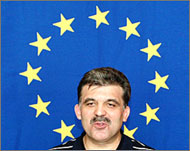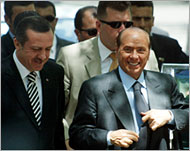EU doubts Turkey entry by 2007
The European Union enlargement commissioner, Guenter Verheugen, said on Thursday it was “too ambitious” to suggest that Turkey might join as early as 2007.
 |
|
Gul’s hopes for EU membership is not likely to fructify in the next four years
|
Reacting to Italian Prime Minister Silvio Berlusconi’s remarks this week after talks with Turkish Foreign Minister Abdullah Gul, Verheugen said “we should not put the cart before the horse.”
On Tuesday, Berlusconi said he was “always been convinced, since 1994 when presenting the application for admission to Europe, the importance of Turkey’s entrance in the union. It is not difficult for me to imagine Turkey in Europe.”
“The West has already had proof of Turkey’s loyalty and capabilities, considering Turkey fundamental in the Atlantic Treaty,” he added.
Turkish Prime Minister Recep Erdogan expressed his “appreciation for Italy’s efforts in convincing its European partners to accept our entrance. I am certain that during the Italian rotating presidency in Europe that Italy will continue to support our cause”.
“At first sight this might be too ambitious,” Verheugen commented however, but added that Turkey was making good progress towards the goals for accession.
Human rights
EU leaders are due to decide in December 2004 whether Turkey has met its standards on democracy and human rights, based on a report from the Commission.
Verheugen had earlier rebuked Turkey for failing to give practical effect to its political reforms, and highlighted the case of a police raid on a human rights organisation in Ankara.
 |
| Berlusconi sees the EU as political giant when Turkey joins |
Gul said the government was determined to implement the laws it had passed: “Implementation is most important. We know that we have problems but we will overcome those problems,” he said.
The raid, which was authorised by a court, had confiscated files and diskettes, but they had all been returned to the organisation, he added.
“Once again, this shows the extent of the gap between the political reforms on one hand and the attitude of the executive and judicial authorities on the other, in terms of implementation,” Verheugen said.
“Human rights organisations must be able to work unhindered and will continue to be supported by the Commission,” he said.
Suspected barriers
Turkey has yet to start accession talks and faces significant barriers to entry, including the dispute over Cyprus, high levels of state debt and inflation, and the acutely sensitive issue of cultural identity.
“The EU will never allow a Muslim state to enter,” said Callum Henderson at the Bank of America in London, revealing information of a poll that questioned 43 analysts at financial and academic institutions around Europe.
However, the poll showed most analysts expect western European resistance to be worn down over the years, allowing Turkey to enter the EU around 2012.
“A more eastward-oriented composition to the EU after 2004 will make Turkey’s presence look less exotic and threatening,” said Roger Monson, who also took part in the survey for CA IB Securities in London.
“Plus, reforms will deepen, making the Turkish economy and politics less different to the EU than at present. A solution to the Cyprus issue will also be found,” Monson predicted.